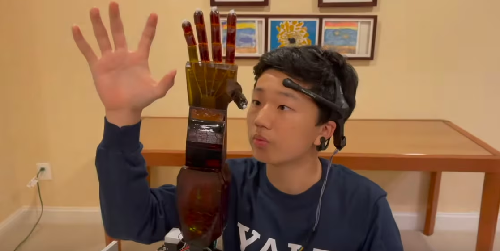A 17-year-old high school student has engineered a groundbreaking, mind-controlled robotic arm that could revolutionize the field of prosthetics. Benjamin Choi, a high school senior from Virginia, has developed a non-invasive, affordable robotic arm that uses artificial intelligence to interpret a user’s thoughts and translate them into movement.
Inspired by a “60 Minutes” documentary he watched as a child about a mind-controlled prosthetic that required risky and expensive brain surgery, Choi set out to create a more accessible solution. He began his project in 2020 at the age of 15, using a simple 3D printer in his home and teaching himself advanced programming languages like C++ and Python.
The key to Choi’s invention is a non-invasive system that utilizes electroencephalography (EEG). The robotic arm relies on just two electrodes: one clipped to the user’s earlobe for a baseline reading and another placed on the forehead to collect brainwave data. This data is then transmitted via Bluetooth to a microchip within the prosthetic arm.
Choi’s breakthrough lies in the powerful AI model he developed and trained himself. The algorithm, which consists of over 23,000 lines of code, deciphers the complex brain signals and predicts the user’s intended movement with a remarkable 95% accuracy. This is a significant improvement over previous neural networks and a major step toward making mind-controlled prosthetics a reality for a wider population.
The prototype, which cost him under $300 to manufacture, is a stark contrast to commercially available prosthetic limbs that can cost hundreds of thousands of dollars. While his invention is still a work in progress, Choi’s work has earned him numerous awards and has garnered widespread attention from the scientific community. He is set to continue his research in engineering in college, with the goal of one day bringing his life-changing invention to clinical trials.







